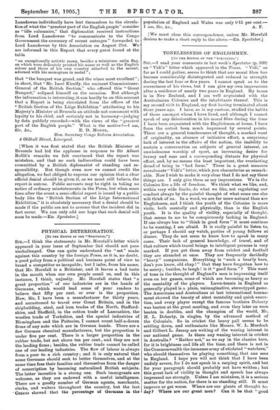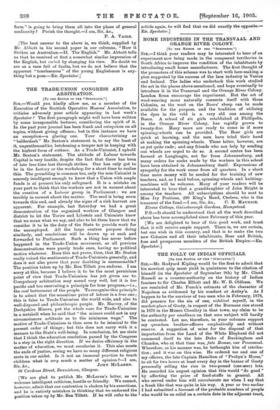Srn,—I read your comments in last week's Spectator (p. 339)
on " Vidi's" letter which appeared in the Times. "Vidi," so far as I could gather, seems to think that our moral fibre has become considerably disintegrated and reduced in strength during the last four or five years. I cannot speak as to the correctness of his views, but I can give my own impressions after a residence of nearly two years in England. My home is in New Zealand, and I am well acquainted with the Australasian Colonies and the inhabitants thereof. This is my second visit to England, my first having terminated about three years ago. I have, as is my custom, studied the habits of those amongst whom I have lived, and although I cannot speak of any deterioration in his moral fibre during the time I have been acquainted with the Englishman at home, I have from the outset been much impressed by several points. These are a general tonelessness of thought, a marked want of originality, an absence of initiative effort, a surprising lack of interest in the affairs of the nation, the inability to sustain a conversation on subjects of general interest, an unwholesome worship of sport, an increasing desire for luxury and ease and a corresponding distaste for physical effort, and, by no means the least important, the everlasting dread of being in "bad form." These in a great measure corroborate "Vidi's" letter, which you characterise as remark- able. Now I wish to make it very clear that I do not say these things are. I only give them as my impressions. We in the Colonies live a life of freedom. We think what we like, and, within very wide limits, do what we like, not regulating our conduct always by the painful thought of what some one else will think of us. In a word, we are far more natural than are Englishmen, and I think the youth of the Colonies is more virile, both mentally and physically, than is the English youth. It is the quality of virility, especially of thought, that seems to me to be conspicuously lacking in England. If one always has to " think in good form " it must continue to be wanting, I am afraid. It is really painful to listen to, or perhaps I should say watch, parties of young fellows at dinner. They do not seem to know how to speak in many cases. Their lack of general knowledge, of travel, and of that culture which travel brings to intelligent persons is very marked. If you get them away from cricket and football they are stranded at once. They are frequently decidedly " heavy " companions. Everything is "such a beasly bore, don't you know, old chap ! " that they have forgotten how to be merry ; besides, to laugh ! is it " good form " ? This want of tone in the thought of England's men is impressing itself even on her games, some of which are becoming as heavy as the mentality of the players. Lawn-tennis in England as generally played is a plain, unimaginative, stereotyped game. The Americans and Australians at last international tourna- ment showed the beauty of alert mentality and quick execu- tion, and every player except the famous brothers Doherty was beaten at the great meeting, and even they later on were beaten in doubles, and the champion of the world, Mr. H. L. Doherty, in singles, by the advanced method of the Colonials. So in cricket the heavy pall seems to be settling down, and enthusiasts like Messrs. W. L. Murdoch and Gilbert L. Jessop are writing of the waning interest in our national game. Is there any waning interest in cricket in Australia ? "Rather not," as we say in the classics here, for it is brightness and life all the time, and there is not in the Commonwealth the immense army of etiolated " watchers," who should themselves be playing something, that one sees in England. I hope you will not think that I have been unduly severe, for I do not speak in a carping spirit, and but for your paragraph should probably not have written ; but this great lack of virility in thought and speech has always impressed me strongly. Unless I am mistaken, it is a serious matter for the nation, for there is no standing still. It must improve or get worse. Where are our giants of thought to- day P Where are our great men? Can it be that " good
form " is going to bring them all into the plane of general mediocrity ? Perish the thought.—I am, Sir, &c.,
P. A. VAILE.
[The best answer to the above is, we think, supplied by Mr. Abbott in his second paper in our columns, "How it Strikes an Australian.—II. The English." Mr. Abbott tells us that be received at first a somewhat similar impression of the English, but ended by changing his view. No doubt we are as a race full of faults, but we do not believe that the apparent " tonelessness " of the young Englishman is any- thing but a pose.—ED. Spectator.]











































 Previous page
Previous page